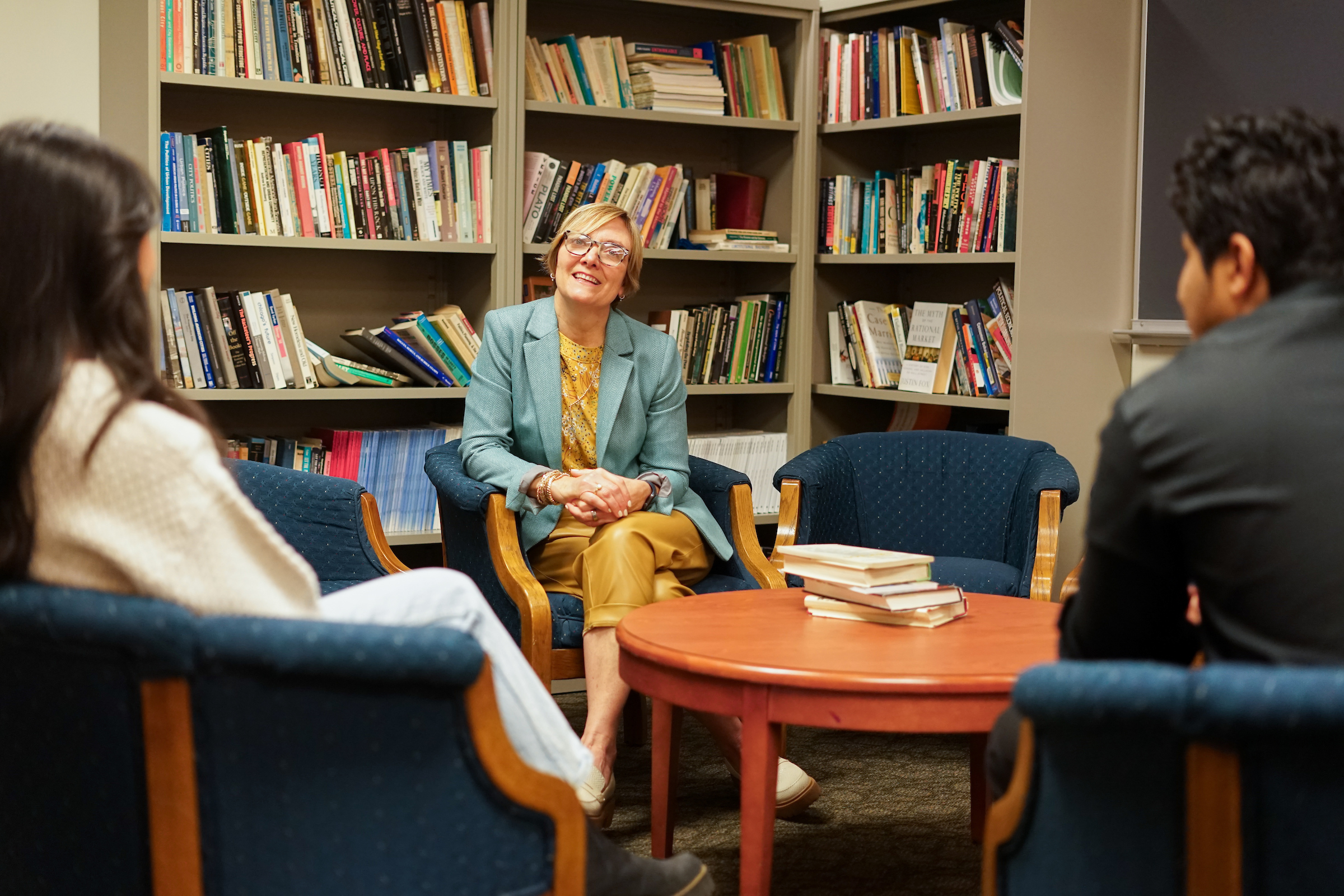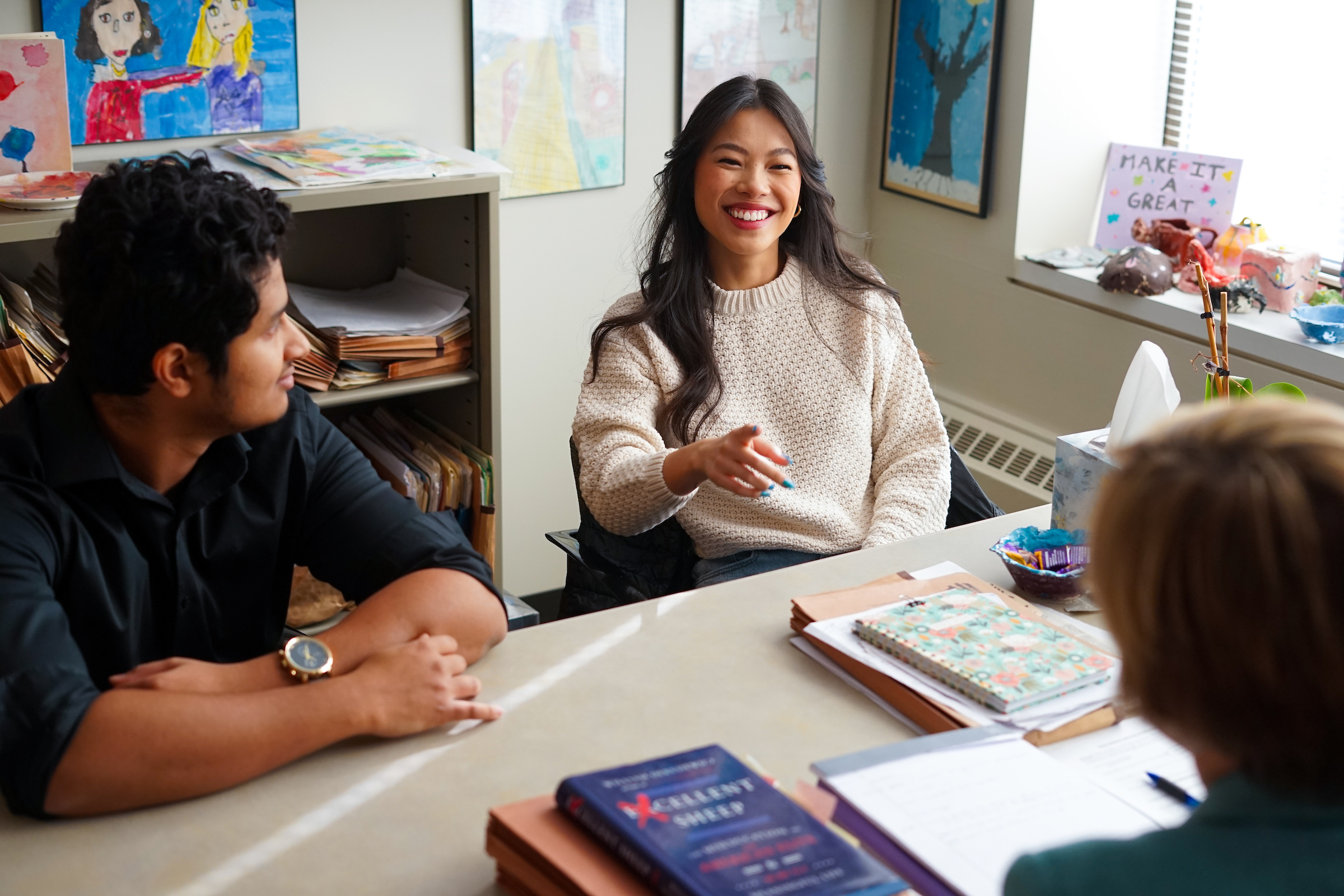
Political science professor Molly Andolina is co-director of DePaul's Civics Initiative. (DePaul University/Shua Soares)

Senior Lilia Jarvenpa and sophomore Bob Sriram have both participated in DePaul Civics Initiative courses. (DePaul University/Shua Soares)
If you have ever taken the train to and from DePaul’s campuses or visited your local library, you are prepared to enter the realm of lived civics. Political scientists Molly Andolina and Ben Epstein created DePaul’s
Civics Initiative to engage with some of the most difficult subjects of our time.
“Lived civics is the idea that our lived experiences are civics experiences, and we bring those experiences with us to the classroom,” explains
Molly Andolina, a political science professor and co-director of the Civics Initiative.
For many, traditional civics education entailed learning about branches of government, voting and U.S. history. The initiative connects civics with students’ day-to-day life.
“We honor students’ experiences interacting with government, power and institutions and use that as a gateway for them to understand civics more broadly,” Andolina says.
During an election year in the U.S., discussions about the rights and duties of citizenship are more important than ever.
“I don’t have any other class that I’ve taught where I feel that it is directly contributing to reducing some of the animosity in politics right now,” says
Epstein, an associate professor of political science. “This class systematically gives students tools to work through these challenges in a way that I don’t have in any of my other classes.”
With a grant from the
Teagle Foundation, Andolina and Epstein developed a multi-section civics course, “
Lived Civics, the Social Contract & Public Life.” Since the pilot in Fall 2022, the class has been taught by faculty across several disciplines including art, philosophy and communications. By training and engaging faculty, Andolina and Epstein hope to make DePaul a hub for teaching civics in higher education.
“Teaching and learning about civics at DePaul are great ways to explore our shared Vincentian values,” says
Matthew Girson, a professor in The Art School who attended a faculty summer training session for the initiative. “Finding ways to fold civics and social contract theory into every discipline allows for a more robust embodiment of our responsibilities within our society and strengthens our democratic institutions.”
Bringing lived civics to the classroom
Andolina and Epstein’s course focuses on the social contract, lived civics and developing skills to discuss civic issues with community members.
Students begin by engaging with the primary texts at the center of American civics, such as speeches by Frederick Douglass, Lyndon B. Johnson, Franklin Delano Roosevelt and Harriet Tubman. Students read Rousseau’s “The Social Contract” and Mill’s response “The Racial Contract,” deconstructing ideas from a variety of perspectives. Then, faculty center students’ lived experiences, while emphasizing listening to others.
“We listened to a podcast about a rich gated community outside of Atlanta, who were angry because their tax dollars were going back into the broader Atlanta area and not directly to them,” says Lilia Jarvenpa, a senior political science major. This led to discussion about one group’s effect on the lives of the wider community, with budget crunches affecting
Atlanta’s public transportation system. “It’s really interesting to see how laws and civics affect people and how it plays out in the real world,” Jarvenpa says.
Sophomore Bob Sriram says Andolina’s course put the lived civics theory into context. “I feel like lived experiences are implied in other civics classes, but never truly explored,” Sriram says. “This class fleshed out the relationship between the government and our lives and made my previous civics classes make more sense.”
To that end, the class creates a comfortable environment for students to discuss their beliefs. “This is a course to help students connect across differences and learn to discuss contentious issues in a way that preserves civility, consideration and empathy,” says Andolina, who shared an overview of the course with
The New York Times.
Creating a “consciously interdisciplinary” program
Over the past two summers, 20 DePaul faculty members have received training stipends to attend the Summer Institute for Faculty to learn how to incorporate civics into one of their courses. At first, most faculty said they didn’t teach civics.
“Once we started talking about it, they realized that much of what they teach could answer questions of civics,” Andolina explains. “The class just gives them permission to label it that way and explore it from an explicitly civics perspective.”
This is certainly true for Girson, who had not formally studied civics or social contract theory before. Now, he connects art and civics as methods for navigating complex roles in our community.
“Learning to live in the uncertainties of art helps us grow individually and collectively. From there, it is an easy step into the world of civics, what it means to be a citizen in a democratic republic, and what our roles are — full of complexity and uncertainty — in maintaining the democratic principles that are the backbone of our social contracts,” Girson says.
For Andolina, the initiative is just beginning to explore how interdisciplinary civics can be. “There are many ways to consider the question of how we live together in community,” she says.
DePaul faculty who would like to participate in the initiative’s Summer Institute for Faculty in 2024 or 2025 are encouraged to visit the
Civics Initiative website to learn more. T
he 2024 Summer Institute will take placed July 17-18.
Jade Walker is a student assistant of media relations and communications in University Communications.